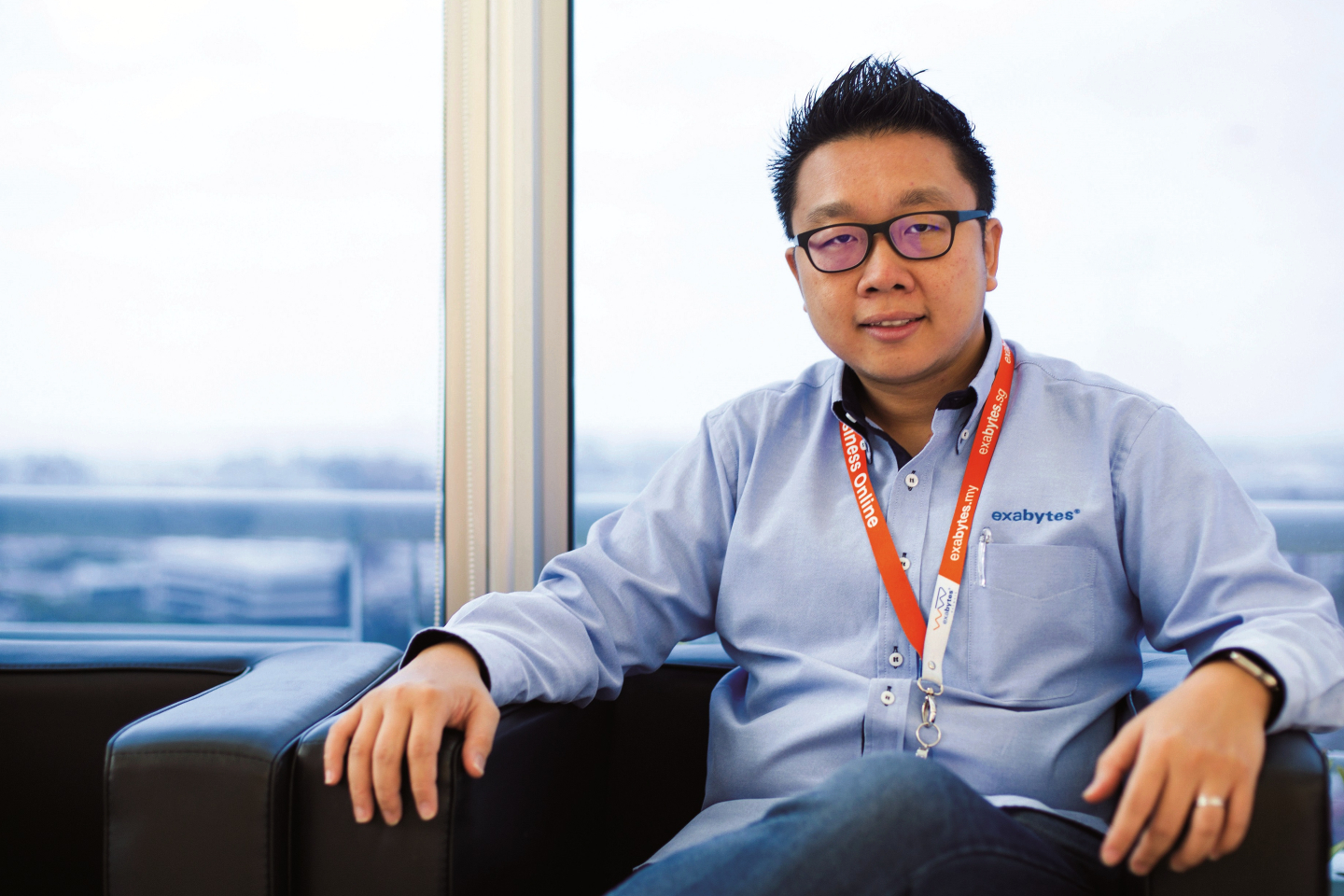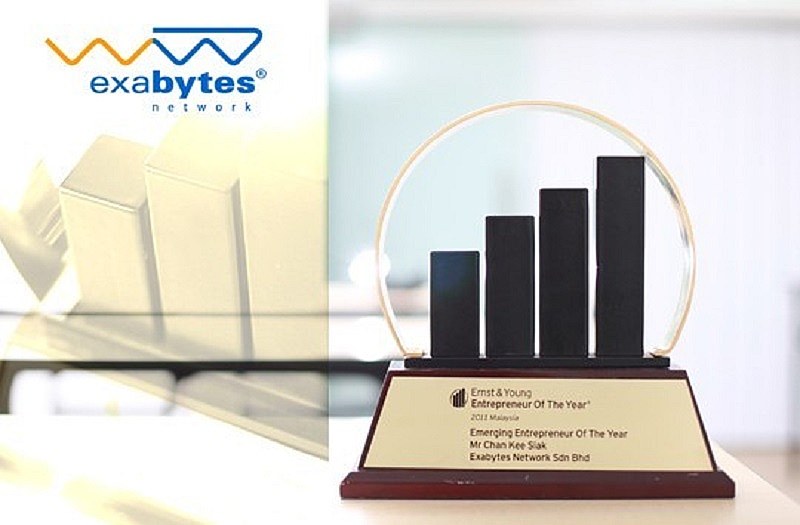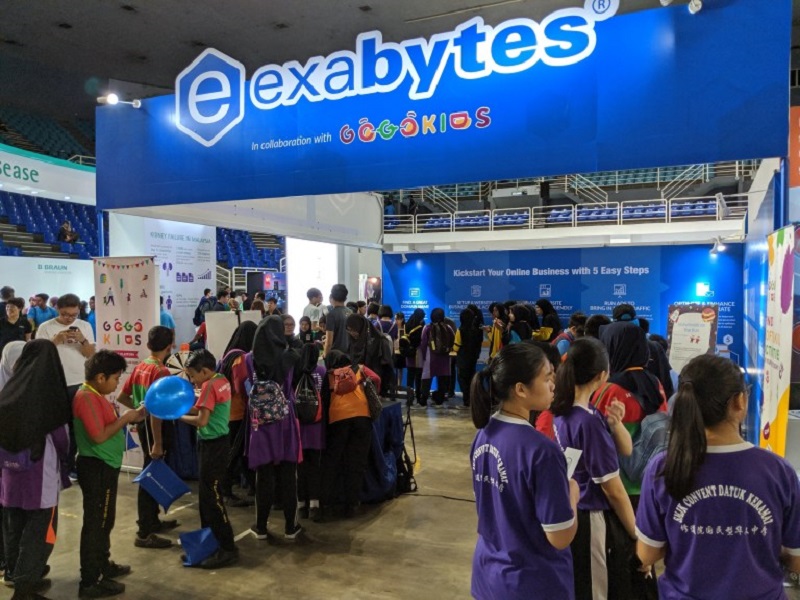
Chan founded Exabytes when he was 19 (All photos: Exabytes)
Although the Covid-19 pandemic and the resulting Movement Control Order (MCO) has dealt many businesses a hefty blow, Chan Kee Siak has benefitted from it. Unable to stick to his hectic travelling schedule, he has not only been able to be a more present husband and father, but he has seen the internet company he founded, Exabytes, enjoy a huge uptick in business as more companies have been forced to go online. Headquartered in Penang, Exabytes provides end-to-end support for a wide range of businesses, in particular small and medium enterprises (SMEs), to grow their digital presence.
“Well, some existing customers unfortunately did have to shut down their businesses, but we did have a huge influx of customers who may not have wanted to go online before but had no choice. We have been extremely busy since March, helping and educating our SME customers in a variety of ways. Because I’ve conducted all my meetings online, I’ve saved a lot of time and been able to be more efficient as well — working from home has been beneficial for us,” Chan admits, smiling.
Founded by Chan when he was a 19-year-old college student in 2001, Exabytes is today Southeast Asia’s leading cloud and digital solutions provider. Starting off offering only web-hosting services, it has grown over the past 19 years to include other offerings such as web security, web design, digital marketing and e-commerce services with a focus on providing solutions to SMEs. “I would say that our support of SMEs is a major part of our DNA,” he adds. “Since Day 1, we have been very focused on small businesses, even though now we serve a lot of large companies and government departments. We are also very online-focused, which means the whole customer experience is pretty much online-based.”
webdesign.jpg

Exabytes has 12 subsidiaries that serve more than 140,000 businesses with over 1 million users in 121 countries.
During the MCO, Chan — who is also co-founder of EasyParcel, EasyStore, EasyWork and EasySpace — increased his focus on helping micro and small businesses manage their operations by bridging the gap between technology and their new needs. His recent Sama-Sama Digital initiative, which was launched on Aug 18 and supported by Malaysia Digital Economy Corporation (MDEC), aims to digitalise local businesses, targeting 2,200 bumiputera SMEs to recover from the impact of the MCO and continue sustaining after the pandemic ends.
Exabytes’ founding story is quite a compelling one, involving Chan dropping out of university to pursue his entrepreneurial journey. Although his tale draws parallels with that of tech industry icons Steve Jobs and Mark Zuckerberg, Chan himself only recommends it under very specific circumstances. “I was in the first year of university in TAR College and my part-time computer business was doing better than my father’s business was. I had a good reason to quit,” he quips. “But in case you were wondering, I do intend to complete my degree one day, just to prove to myself that I can do it.” Zuckerberg completed his Harvard degree many years after dropping out.
Chan has a humble background and grew up assisting his father at his hawker stall — entrepreneurship was in his blood. But the industrious young lad was always more interested in computers and had a natural flair for it. Even in secondary school, his family members would often solicit his help when their machines needed fine-tuning.
Chan knew this was something he could make a business out of, and was deeply inspired by the way chairman and CEO of Dell Technologies Michael Dell had embraced computing and e-commerce. “To sell computers, I need to have a website. And to have a website, you need a web hosting company. There were very few in Malaysia offering hosting services at the time, so I decided to create one of my own. That’s how Exabytes started.”
In the last 20 years, the tech industry has changed completely. Although Exabytes’ objectives remain the same, which is to help SMEs operate better and more effectively on the internet, the company’s products have changed quite a bit. Websites are no longer mere pages of information that go only one way, but interactive sites that often ask for extras like payment gateways, and they also need to be mobile-friendly. “The landscape has become more complex, that’s for sure, and the growing use of mobile internet has also impacted our business,” Chan says. “From purely desktop-driven activity, we now have to focus on mobile technology.”
Testament to its success, Exabytes has won several industry awards over the years, while Chan’s leadership has also netted him, among others, the JCI Creative Young Entrepreneur Award in 2007. He was the winner of the Emerging Entrepreneur category of the EY Entrepreneur Of The Year Award in 2011.
ernst.jpg

While the success of his customers mean the most to Chan, he does not deny the value of the awards, most of which were received about a decade ago. “At that time, as an entrepreneur in my 30s, it was so encouraging as everyone else was much older than I was,” he observes. “I also really appreciated the chance that the awards gave me to be a role model, or mentor, to younger entrepreneurs so I could help them in their journey.”
Chan looks back on his story of entrepreneurship with fondness, but acknowledges that it was much harder back then. “There wasn’t much help for businesses that were starting out, no funds you could apply for. You had to find your own way and bootstrap your way forward. I worked through that difficult path and it was only 10 years into my business when I met my angel investor — normally you meet them at an earlier part of your journey — and that’s when I could really grow from a mid-size company to something larger. I got past a serious bottleneck and I learnt so much, which is why I believe very much in supporting other start-ups in the same way. I want to give back to these companies and give them the help I never got.”
Some of the companies he has invested in include online human resource software Kakitangan.com, recruitment company WOBB, Penang-based technology and future skills learning centre Future School and GogoKids, which helps parents find fun activities for their children in their areas. His investment portfolio is based on his personal interests — as a parent of two boys, he sees education as a major thrust going forward as “we all seek out new ways for children to learn, whether at school or if they are studying at home”. He also wants to reinvest into the tech industry, which is how Silicon Valley’s tech industry was able to grow and develop.
mvimg_20191103_102736.jpg

Although he did not finish his university studies, Chan’s parents do not hold it against him especially since he is actively seeking to complete it. Instead, they are proud of his achievements, even if they do not entirely understand what he does. “I still won’t recommend it,” he laughs. “I do want to finish my degree, but I keep getting too busy. Maybe lah, when I am semi-retired.”
Indeed, Internet-based companies do brisk work in this day and age — Exabytes is keeping very busy indeed as the company grows with its clients and their rapidly changing needs. “Our potential is tremendous in two ways. We have a growing customer base as Covid-19 really accelerated the digitisation process for so many businesses, and there are so many new products for them as well. Second, I believe we have a lot of possibilities to grow across Southeast Asia.”
Chan recalls a few major milestones that convinced him that leaving university and starting Exabytes was the right move. “In 2005, we had become the largest web hosting company in Malaysia and made me realise that any internet-based business had a real future. About 10 years ago, we ventured into Singapore and acquired a few companies, which made us a major player there. A few years ago, we entered the Indonesian market and last year, we completed our first acquisition, which brought us several thousand new customers. We are still in the early stages of our plans to expand in the region, there is still so much we can do,” he says, proudly.
Chan may not be able to travel to these countries anytime soon but he isn’t worried. “I’m a pro at video calls already, I can do so many in one day. Southeast Asia is no problem!”
This article first appeared on Nov 16, 2020 in The Edge Malaysia.


